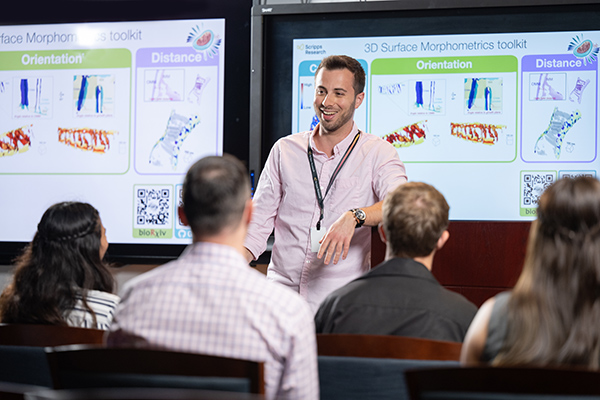T32 Postdoctoral Training Program

Scripps Research is recognized as a leader in translational science, built upon the pillars of distinguished faculty, comprehensive training and an interdisciplinary research environment. With unique capabilities to translate foundational scientific discoveries into clinical applications, Scripps Research offers a dynamic environment where early-career scientists can develop innovative approaches to improving human health.
From bench to bedside, the T32 postdoctoral training program promotes translational methodologies to transition basic research toward patient-centered outcomes by integrating cutting-edge fields such as genomics, structural biology, and biochemistry.
The Clinical and Translational Science Award (CTSA) T32 postdoctoral training program aims to establish a new generation of early career scientists capable of bridging science and medicine for the challenges of chronic and emerging diseases in the rapidly changing world of health care. Basic science, elucidation of mechanisms of diseases, discovery of new therapeutic approaches and drugs, and digital monitoring of health are primary areas of investigation for our members. In addition, an important component of science citizenship is included in our training to promote three important core competencies: (i) scientific rigor, (ii) resilience, (iii) mentorship, and (iv) community engagement. The program funds three postdoctoral T32 scholars for up to three years, with a special focus on building research independence and skillsets that align with successful careers in translational science and medicine.
The T32 Program at Scripps Research is linked with the NIH National Center for Advancing Translational Science (NCATS) Clinical and Translational Science Awards (CTSA) Program, leveraging Scripps Research Translational Institute's unique interdisciplinary environment. Connected to a top-tier life sciences graduate school and its award winning faculty, the T32 program provides translational science training through specialized coursework and mentorship. Key areas of focus include biostatistics, clinical study design, genomics, and computational biology. Founded by Dr. Eric Topol, SRTI emphasizes precision medicine, integrating it into both research and educational frameworks. Through hands-on workshops and collaborative projects, the program equips post-doctoral scholars with practical skills to advance translational science, supporting CTSA’s mission to improve health outcomes.
- US citizen or equivalent as detailed by the NIH/T32 guidelines for recipients of trainee funding.
- Verified completion of a PhD in a relevant scientific discipline (part of the employment verification process for postdoctoral appointment at Scripps Research).
- Mentee of a T32 participating faculty member at Scripps Research or new faculty member willing to join our training program.
- Scientific proposal qualified as translational by the T32 and K12 directors. Mentors and mentees are highly encouraged to contact the program directors before proceeding with their application. This consultation is also critical to establish relevant connections with clinicians and access to appropriate samples and data.

